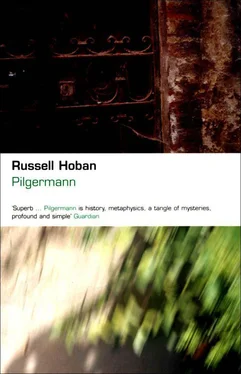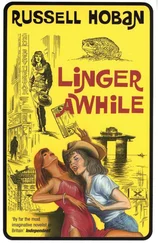Russell Hoban - Pilgermann
Здесь есть возможность читать онлайн «Russell Hoban - Pilgermann» весь текст электронной книги совершенно бесплатно (целиком полную версию без сокращений). В некоторых случаях можно слушать аудио, скачать через торрент в формате fb2 и присутствует краткое содержание. Год выпуска: 2002, Издательство: Bloomsbury Publishing PLC, Жанр: Современная проза, на английском языке. Описание произведения, (предисловие) а так же отзывы посетителей доступны на портале библиотеки ЛибКат.
- Название:Pilgermann
- Автор:
- Издательство:Bloomsbury Publishing PLC
- Жанр:
- Год:2002
- ISBN:нет данных
- Рейтинг книги:5 / 5. Голосов: 1
-
Избранное:Добавить в избранное
- Отзывы:
-
Ваша оценка:
- 100
- 1
- 2
- 3
- 4
- 5
Pilgermann: краткое содержание, описание и аннотация
Предлагаем к чтению аннотацию, описание, краткое содержание или предисловие (зависит от того, что написал сам автор книги «Pilgermann»). Если вы не нашли необходимую информацию о книге — напишите в комментариях, мы постараемся отыскать её.
Pilgermann — читать онлайн бесплатно полную книгу (весь текст) целиком
Ниже представлен текст книги, разбитый по страницам. Система сохранения места последней прочитанной страницы, позволяет с удобством читать онлайн бесплатно книгу «Pilgermann», без необходимости каждый раз заново искать на чём Вы остановились. Поставьте закладку, и сможете в любой момент перейти на страницу, на которой закончили чтение.
Интервал:
Закладка:
It would have been easy enough to leave the city — Mount Silpius, as I have said, kept a back door open — so that we might live yet awhile and do our dying elsewhere but neither of us wanted to. It was in Antioch that a readiness to die had come upon us and now we felt committed to that place; to take our dying elsewhere would have seemed frivolous and disloyal. Both of us admitted to a certain vanity about dying: we preferred to do it as handsomely as possible; but we agreed to be guided by the circumstances and not, when the proper moment came, to refuse a lesser death in the hope of winning a greater one some other time.
My original idea of attaining Jerusalem before it was too late, before Jesus withdrew from any further possibility of manifestation and the world was left with the bleakness of what he had called ‘the straight action and no more dressing up’ now seemed like those fond hopes of childhood that even a child recognizes as being made of that kind of mental sugar-candy that melts in the hard sunlight of reality.
The siege as the months passed had developed, as does everything, its own particular rhythm and mode of being. When the Franks had first appeared outside the walls of Antioch Yaghi-Siyan had at every moment expected a major assault. He quadrupled the watch on the walls; he kept the citadel on constant alert; and he mobilized every male young and old who was capable of lifting so much as a stick or a stone against the enemy. All civilians were organized into a militia who in the event of an attack would respond to a trumpet call and would be under the command of an officer of the garrison. The months had passed; the attack had not come. This condition of no-attack became more and more a condition of no-attack, like a very thin-shelled egg that grew bigger and bigger, older and older until, enormous and rotten, it now hung suspended above us.
This night that I am speaking of, this winter night without rain and without a moon — I have called its darkness opaque but I was not being accurate: there was some light in the sky, it was not utterly black. It was a night of obscurity, yes, obscurity is the word I want; it is this that makes that night such a paradigm of the rushing forward, the rushing back, that so much of history is made of.
In this obscurity we stood and into it we looked across the river towards the encampment of the Franks. Some of the tents with candles burning in them were like dim and feeble lanterns. Between those few dim lanterns and us ran with a strong rushing, with a heavy running, the river heavy with the rains, darkly rushing, gurgling, like a giant animal that drinks blood. Mingling with the rush of the river was the subterranean echoing rumbling grinding rolling roar of Onopniktes. These strong rushing-water sounds made the dim and feeble lantern-tents seem even dimmer and feebler and farther away. In the quietness of the Frankish camp a man began to sing. His voice rose and fell sadly, there was no word that I could understand except the oft-repeated name of Jesus, Jesu. There was no accompanying instrument but the manner of the song was suggestive of a lute. After a time someone shouted, the singing stopped, there was only the running of the river, the roar of Onopniktes.
We could hear then behind us, on the road between Yaghi-Siyan’s palace and the bridge, a trotting of horsemen coming and going and we could hear many shouts, now here, now there, of the sort that are heard when cavalrymen gird themselves for something of importance. The shouts, the clopping of hooves increased, horses whinnied, there was much shuffling, snuffling, snorting, stamping, jingling, clinking, slapping, and grunting as all of the sounds formed themselves into a concerted picture of dark colours, dark gleamings, dark horsemen girding.
The sound-picture gathered itself into a forward movement, came towards us, passed beneath us, appeared in front of us on the bridge in the dark images of itself, the dark gleamings of iron and leather, the forested lances nodding, the shaking of reins and bridles as the horses tossed their heads. The clop of hooves, the clinking and the jingling passed into the darkness across the river, quickened unseen to a trot, a canter; for the first time then the kettledrums were heard, they pounded out the headlong gallop of the charge as voices whooped in war cries, voices called on Allah. There came then Frankish cries to Jesus, cries to God, cries of ‘Saint-Gilles!’
Suddenly the clamour of the drums is heard again — a different beat, the choppy rhythm of unluck and about-turn. Here now the Turks are coming back in thunderous flight across the bridge. ‘To the gate!’ they cry. ‘Back to the gate!’ cries Yaghi-Siyan at the head of the rout. ‘Deus le volt!’ cry the Franks, ‘Saint-Gilles!’ ‘The gate!’ cry the Turks. With these shouts we hear the clash of weapons, the screams of the wounded and the dying, the screams of horses and of men, the groans and curses, the grunts and trampling and scuffling of men fighting for their lives, and the splashing of men and horses into the river. ‘Saint-Gilles!’ goes up the shout, it seems very close, almost beneath us. ‘Jesu!’
Back across the bridge ebb the voices of the Franks. ‘There is no god but God!’ shouts Yaghi-Siyan, and once more the Turks gallop across the bridge and into the darkness beyond it. Now from across the river we hear again, but indistinctly and mingled with the running of the river and the subterranean roar of Onopniktes, the clash of weapons, the shouts and cries, the screams of horses and of men. Below us on the bridge the dead in their obscurity lie still, the wounded and the dying writhe and groan, both men and horses; the horses lift their long necks, their noble heads, and fall back; they can no longer gallop to the battle or away from it.
Now with others Bembel Rudzuk and I go down to the bridge to bring in the wounded and the dead. The crippled horses are killed with a sword stroke to the neck, the blood spurts out on to the stones of the bridge. I think of how this blood would be better than wine to the starving Franks. The horses that can walk are brought back inside the walls with the wounded men. With their eyes the horses acknowledge that they are slaves; if they were owned by scholars they might have led quiet lives but as they are ridden by fighting men they must suffer these wounds, they can expect nothing else. In the fluttering light of torches the wounded men look at me with eyes like the eyes of ikons or statues or like the eyes made of white and black tesserae in mosaics. The heads from which the eyes look out have been vertical only a little while ago; now they are horizontal, and these men, like the horses, acknowledge with their eyes that they are the slaves of that in them which has used them up in this rushing forward and back in the darkness; having used them up it will find others for its purpose.
These bodies that I try to repair, already have they been violated once by cold iron; now again I violate them, I intrude upon their privacy to stuff entrails back into the places where they belong, to sew up flesh that has been violently parted. How startling are the secret colours that in time of peace are hidden beneath the skin. We slaughter sheep and cattle and chickens as a matter of course; we are the vertical ones with the knives so we assume this as a right: we slit the throat, the heart pumps out its last bursts of blood into a basin, we open up their bodies and lay hands upon their varicoloured mysteries of red and purple, blue and yellow inner parts. But in time of war each man is a cattle to his enemy and they struggle to see which one will be the slaughterer. The stranger, the unknown to whom one must always offer hospitality, that sacred stranger has now become a murderer whom we must murder first. How strange that this is not strange.
Читать дальшеИнтервал:
Закладка:
Похожие книги на «Pilgermann»
Представляем Вашему вниманию похожие книги на «Pilgermann» списком для выбора. Мы отобрали схожую по названию и смыслу литературу в надежде предоставить читателям больше вариантов отыскать новые, интересные, ещё непрочитанные произведения.
Обсуждение, отзывы о книге «Pilgermann» и просто собственные мнения читателей. Оставьте ваши комментарии, напишите, что Вы думаете о произведении, его смысле или главных героях. Укажите что конкретно понравилось, а что нет, и почему Вы так считаете.












